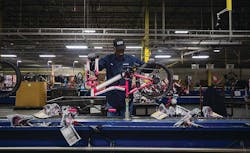The US Can Rebuild Its Iconic Bicycle Manufacturing Industry
Americans love to ride bikes. But right now, consumers are finding that there’s a wait of many months to buy a new bike. That’s because delivery delays and global supply chain problems have left Americans waiting from six to 18 months to get a new bike. These delays are now so bad that the U.S. Census Bureau recently addressed them in a data-filled article.
Part of the problem is that America has lost almost all of its domestic bicycle manufacturing industry. Last year, imports accounted for 97.1% of all bikes sold in the U.S. That’s a drastic change for a product that was once predominantly manufactured in America. But at the same time, China has also opportunistically taken over the bike industry—and used a web of government subsidies to seize 87.3% of America’s bike market.
Although China’s bike onslaught has led to famous American brands closing their doors, there’s still an opportunity to rebuild U.S. bicycle manufacturing. As a new report by the Coalition for a Prosperous America (CPA) explains, this rebuilding would start with bike assembly but eventually include the manufacturing of bike frames, gears, brakes and other components. The federal government would need to support this reshoring. But the costs—at under $1 billion of tax credits and SBA loan guarantees—would be minimal.
Americans purchase 18 million bikes each year. Implementing a full bike reshoring plan could lead to roughly 25% of those bikes being assembled domestically within five years. CPA’s report estimates that this could create roughly 10,000 new, good-paying manufacturing jobs in the U.S.
Such job creation could be especially helpful for communities of color. When the U.S. bike industry shut down in Illinois, Ohio, Pennsylvania and elsewhere, minorities took a disproportionate hit because they made up a significant share of the workforce. However, Kent International, the largest remaining U.S. bike manufacturer, already employs many women and workers of color at its Manning, South Carolina plant. Since bicycle manufacturing generates good-paying manufacturing jobs for people without college degrees, this kind of work could help to reinvigorate many hard-hit communities.
The European Union provides a template for such an effort. Beginning in 1993, the EU took aggressive action to block subsidized Chinese imports through stiff anti-dumping duties. In the early 2000s, EU countries began providing support for local manufacturers to invest in bicycle manufacturing. As a result, the EU today produces about 50% of the bikes—and 85% of the e-bikes—purchased in Europe. Portugal in particular has emerged as a major bicycle manufacturing hub—and now produces five times as many bikes as the U.S.
The emergence of the e-bike is an important turning point, too. E-bike sales are surging, with responsive, variable-speed motors helping non-athletes to enjoy riding. As a result, adults are increasingly using e-bikes for commuting and exercise. New York City has already doubled its share of bike lanes, and other cities are following suit.
A provision in the latest version of the House Democrats’ Build Back Better plan provides a $750 tax credit for consumers purchasing an e-bike. As it stands, almost all of that revenue will flow straight to China. However, rebuilding America’s bike industry could provide a means to ensure that the majority of this tax credit stays at home—creating jobs and opportunities for U.S. workers.
Half a century ago, American kids rode Schwinn Sting-Rays—a product proudly made in the United States. We can once again buy American-made bikes through a smart reshoring plan for this venerable industry. Doing so would provide a roadmap for broad-based growth in other high-paying manufacturing industries—a smart path forward for U.S. economic security and “Made in USA” pride.
Jeff Ferry is chief economist at the Coalition for a Prosperous America. Follow him at @menloferry.
